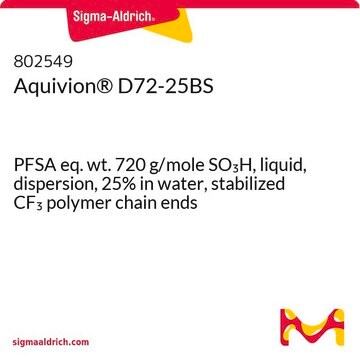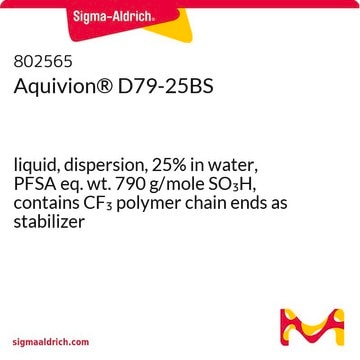70160
Nafion™ 117 containing solution
~5% in a mixture of lower aliphatic alcohols and water
Synonyme(s) :
Tetrafluoroethylene-perfluoro-3,6-dioxa-4-methyl-7-octenesulfonic acid copolymer
About This Item
Produits recommandés
Forme
liquid
Caractéristiques du produit alternatif plus écologique
Design for Energy Efficiency
Learn more about the Principles of Green Chemistry.
sustainability
Greener Alternative Product
Concentration
~5% in a mixture of lower aliphatic alcohols and water
Indice de réfraction
n20/D 1.38
Autre catégorie plus écologique
InChI
1S/C7HF13O5S.C2F4/c8-1(9)2(10)24-5(15,16)3(11,4(12,13)14)25-6(17,18)7(19,20)26(21,22)23;3-1(4)2(5)6/h(H,21,22,23);
Clé InChI
FOYUGSIADQEOEK-UHFFFAOYSA-N
Description générale
Application
- polyelectrolytic membrane for fuel cells
- metal extraction from aqueous solutions
- for the production of hydrogen by thermochemical water splitting
- as a reference membrane to evaluate the methanol permeability
Informations légales
Mention d'avertissement
Danger
Mentions de danger
Conseils de prudence
Classification des risques
Eye Dam. 1 - Flam. Liq. 2 - STOT SE 3
Organes cibles
Central nervous system
Code de la classe de stockage
3 - Flammable liquids
Classe de danger pour l'eau (WGK)
WGK 3
Point d'éclair (°F)
67.0 °F
Point d'éclair (°C)
19.44 °C
Certificats d'analyse (COA)
Recherchez un Certificats d'analyse (COA) en saisissant le numéro de lot du produit. Les numéros de lot figurent sur l'étiquette du produit après les mots "Lot" ou "Batch".
Déjà en possession de ce produit ?
Retrouvez la documentation relative aux produits que vous avez récemment achetés dans la Bibliothèque de documents.
Articles
Proton exchange membrane (PEM) fuel cells operate at relatively low temperatures and are composed of two electrodes and a conductive elecrolyte.
Contenu apparenté
Batteries, fuel cells, and supercapacitors rely on electrochemical energy production. Understand their operation and electron/ion transport separation.
Les batteries, supercondensateurs et piles à combustible sont des dispositifs de stockage et de conversion d'énergie, basés sur la production d'énergie électrochimique au niveau d'une interface électrode/électrolyte et d'une séparation assurant le transport d'électrons/ions.
Notre équipe de scientifiques dispose d'une expérience dans tous les secteurs de la recherche, notamment en sciences de la vie, science des matériaux, synthèse chimique, chromatographie, analyse et dans de nombreux autres domaines..
Contacter notre Service technique










